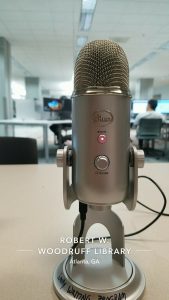Creating this podcast was a completely new adventure for me. I’ve never had to use this type of audio creativity for a class, so it was a huge hurdle to overcome in terms of a new learning experience. However, the three-person group dynamic was helpful for brainstorming sessions and bringing different perspectives and creativities to the table. We began by choosing a specific publication we all felt comfortable researching and discussing. From there, our main method of collaboration and communication was over a google doc, where we inputted sources and topics to analyze. As Ben and I worked on it independently, we jumped off of each other’s ideas to form a bulleted script. A large issue we had to deal with was being the first podcast. We had very few creative examples to draw from, which led to us going off topic several times. Re-analyzing our purpose and using class resources helped us create a podcast that we felt was a quality “first podcast”.
One of the bigger challenges I faced was delegation of roles. As a group, we weren’t entirely sure what our roles entailed, so we improvised throughout the project. In the end, the Producer and Assistant Producer ended up having equal roles in researching, writing, and talking in the podcast, while the line producer took on a more technical role of editing and managing the structure of the podcast.
Our main goal for this podcast was to produce a clear, concise, and engaging episode that stayed on topic and used the lenses of Creeber and Jenkins. More specifically, we wanted to sound natural, rather than scripted. We aimed to stay bipartisan and veer away from any political commentary that could take away from the main message of our podcast. I found it difficult to find concrete ways to hold ourselves to these goals, but in order to sound conversational, Ben and I found it helpful to create bullet points rather than a word-for-word script. Also, having Spenser monitor the audio in real time helped us stay to our goal of being on topic and nonpartisan. Spenser acting as a “live audience” was crucial to keeping to our goal of clarity and engagement, as he would tell us when we needed to reformulate a point or conversation. Despite this, I felt if we had more time, the flow of the episode could’ve been better. Most of the time it was just Ben and I giving points back and forth, which wasn’t very engaging.
The most prominent class objective I used was collaboration. Working together as a group made this new, scary process much smoother. It also created a product that turned out much better than if we all did it alone, as we provided constructive criticism throughout the process of recording. I also utilized the rhetorical composition skill, as I had to use a different organizational and stylistic strategy to express my point via audio. This pushed me out of my comfort zone for rhetorical composition and certainly strengthened that skill through the podcasting process.
